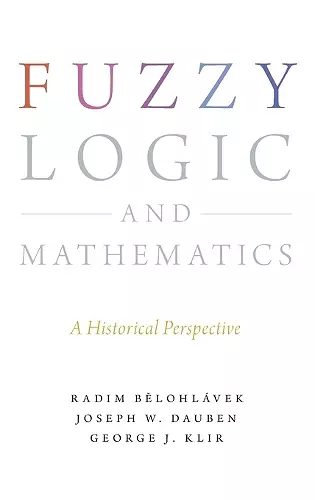Fuzzy Logic and Mathematics
A Historical Perspective
George J Klir author Joseph Warren Dauben author Radim Belohlavek author
Format:Hardback
Publisher:Oxford University Press Inc
Published:29th Jun '17
Currently unavailable, and unfortunately no date known when it will be back

The term "fuzzy logic" (FL), as it is understood in this book, stands for all aspects of representing and manipulating knowledge based on the rejection of the most fundamental principle of classical logic: the principle of bivalence. According to this principle, each declarative sentence is required to be either true or false. In fuzzy logic, these classical truth values are not abandoned. However, additional, intermediary truth values between true and false are allowed, which are interpreted as degrees of truth. This opens a new way of thinking--thinking in terms of degrees rather than absolutes. For example, it led to the definition of a new category of sets, referred to as fuzzy sets, in which membership is a matter of degree. The book examines the genesis and development of fuzzy logic. It surveys the prehistory of fuzzy logic and inspects circumstances that eventually lead to the emergence of fuzzy logic. The book explores in detail the development of propositional, predicate, and other calculi that admit degrees of truth, which are known as fuzzy logic in the narrow sense. Fuzzy logic in the broad sense, whose primary aim is to utilize degrees of truth for emulating common-sense human reasoning in natural language, is scrutinized as well. The book also examines principles for developing mathematics based on fuzzy logic and provides overviews of areas in which this has been done most effectively. It also presents a detailed survey of established and prospective applications of fuzzy logic in various areas of human affairs, and provides an assessment of the significance of fuzzy logic as a new paradigm.
While the book certainly contains a very comprehensive and thoughtfully organized, up-to-date overview over almost all research areas connected to fuzzy logic that subscribe to a mathematical methodology, it also provides a highly informative and very balanced account of the debates and controversies that accompanied its history. ... it is not only invariably informative, but also a pleasure to read: central actors come to life and important events are reviewed in a vivid manner. Moreover, even technical material is presented in an accessible style. ... the book will certainly remain an invaluable resource for more than one class of readers for quite some time. * Christian Fermüller, Notre Dame Philosophical Reviews *
Now this book has appeared, there is much that ensures that it will be the classic reference for many years to come. First, the book is rather complete... second, the book covers the history of the field... third, the scientific level is highly adequate. * Alfred Stein, Nieuw Archief voor Wiskunde *
ISBN: 9780190200015
Dimensions: 163mm x 239mm x 46mm
Weight: 834g
544 pages